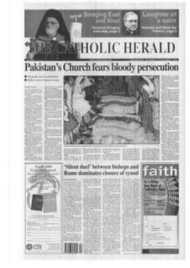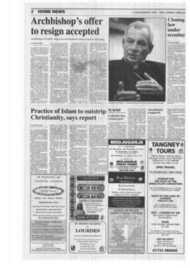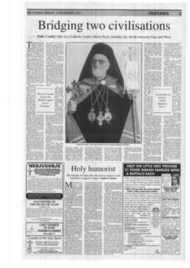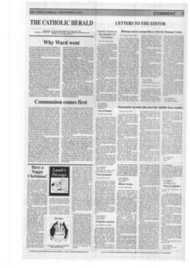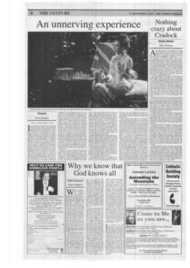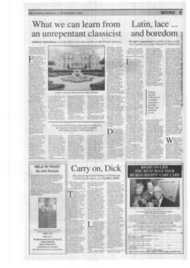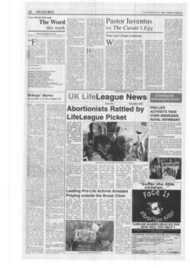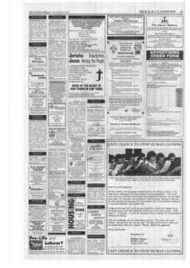Page 12, 2nd November 2001
Page 12

Report an error
Noticed an error on this page?If you've noticed an error in this article please click here to report it.
Tags
Share
Related articles
Court Pomp And Circumstance
Inside
Seeking A Bedside Aesthetic
Charterhouse Chronicle
Where Is This Catholic Revival?
Visiting the curious world of the liturgically correct
Charterhouse Chronicle
Gerard Noel
'shall this very day, be attending what promises to be an extremely interesting reception at St James's Palace. Our host will be the Prince of Wales in his capacity as Patron of the Prayer Book Society.
The occasion is to launch the Lord Martin Charteris Appeal, in memory of the society's erstwhile president, a distinguished former British ambassador and provost of Eton College. My last meeting with Lord Charteris was in the Member's bar of the House of Lords and our conversation, as I happen to remember, concerned the very subject of the Prayer Book Society.
The society's principal aim is to promote interest and devotion to the 1662 Prayer Book. which from the pen of Thomas Cranmer was, of course, a magnificent piece of work. It was. indeed, a great pity that when the Latin Mass was. after the delay of four centuries, produced in a different (more theologically correct) English form, generous borrowings were not made from Cranmer's classic work.
The aims of the Prayer Book Society are, in general. very worthy ones. Its officers are prominent and distinguished persons and its members well-meaning and invariably most charming. It must unfortunately be said, however, that the exclusion of those Christians of whom the society does not approve, and the displaying, from time to time, of a rather shaky grip on liturgical history, are regrettable circumstances.
They arc regrettable chiefly because, in their absence, the society would unquestionably prosper more vigorously and probably be more successful, by widening its support, in the worthy task of raising funds. The society is strongly Anglo-Catholic in its aims; nothing wrong with that, of course. An unfortunate by-product of such a stance, however is that (what they call Roman) Catholics are barred from full membership. Though no doubt technically legal, such an outlook is hardly ideal in the present-day Christian climate and ordinary members of the society are surprised by the exclusion when and if they come to hear about it. Wishing the Society well, as I do, I can't help hoping it might do itself a favour by revising this rule.
As for theological and historical accuracy, I noticed, in the latest edition of the society's magazine that exception is taken to the expression "president" when referring to the celebrant of a eucharistic service. The reason for this, presumably, is the quite incorrect one that the expression is "modern" and not, liturgically speaking. liturgically correct.
Interestingly enough, nothing could be further from the truth. The expression derives from the mid-2nd Century AD description by Justin Martyr of a typical eucharistic celebration from that day. Those early Christians met informally and having exchanged a sign of peace elected one of their number to "preside" over the proceedings. It is not even laid down that such a person must be a man. The service that followed was more like the (Roman) Catholic Mass of today than the (much later) so-called Tridentine version. Prayer Book Society members, in other words, are not the only ones to get such things wrong. They can count on the company of many self-styled "traditional" Catholics.
/have been reading a charming book by Julian Hine called Morning. It is included in his complete works currently being published. It is the tale of a boy's seventh and eighth years of life with all its mysteries and apprehensions. It is told with unusually acute and sensitive observation, avoiding sentimentality, of the boy's reactions to outwardly ordinary outside events as he makes that difficult transition from childhood to boyhood. It is cast in the now pre-war world of nannies, nursemaids, gamekeepers, doting but distant parents and the ominous prospect for boys of eight of being sent away to boarding school.
The publication of Fane's complete works is a most welcome publishing event. Great credit must be extended to the distinguished publishing house of Constable now given new lease of life under its new name and management as Constable and Robinson.
Julian Fane is one of the greatest and
most gifted of modern British writers. In now making his works even better known to a wider audience his publishers are performing a most valuable service to him, and to us all.
The particular title among the complete works will ring a special bell for Catholics. Although written for a general readership, for Catholics it may well recall those years of childhood which were made unnecessarily fearful and unhappy because of the strict religious upbringing conventions of 60 years ago. Sensitive boysand girls were sometimes tortured with fears and they did not dare to express least of all in the world described by Fane, to their own parents of being in a state of serious sin.
Some such children took years to get over the effect of this. Some never really did. We may well have, in the Catholic world of today, more to be thankful for than we always realise.
The first Charterhouse, incidentally, was conceived almost exactly 30 years ago. It was written by myself and appearing over the by-line "Redactor". When I was first editor, in the early '705 our office was at 67 Fleet Street, on the corner of Whitefriars Street. We were thus on the hallowed ground which had been the original London home of the English
Carmelites, and our weekly diary feature, then on an inside page, was entitled Whitefriar's Journal.
As our new office was almost next door to the old Carthusian Charterhouse, the obvious title for the column seemed to be Charterhouse Chronicle.
The feature was unexpectedly successful and attracted a lot of correspondence. So much that after about a year I found it increasingly difficult to combine writing it myself with editing the paper. So I was delighted when Patrick O'Donovan agreed to take it over, making it, as he did, something of a classic of its kind.
blog comments powered by Disqus


